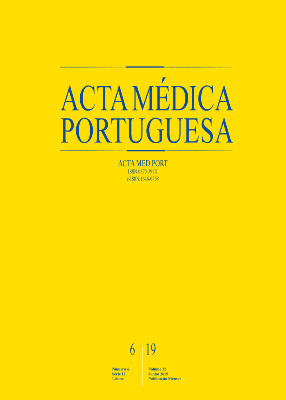Pre-Exposure Prophylaxis Counseling in a Community Sexual Health Clinic for Men Who Have Sex with Men in Lisbon, Portugal
DOI:
https://doi.org/10.20344/amp.11474Keywords:
Counseling, HIV Infections/prevention & control, Homosexuality, Male, Pre-Exposure Prophylaxis, Sexual BehaviorAbstract
Introduction: Pre-exposure prophylaxis is defined as the use of antiretroviral drugs to prevent HIV acquisition in uninfected individuals. Recognizing the increasing use of informal pre-exposure prophylaxis in Portugal, CheckpointLX, a community clinic targeted to men who have sex with men in Lisbon, Portugal, began offering counselling and follow-up services prior to formal introduction. This study aims to characterize pre-exposure prophylaxis users attending CheckpointLX before formal pre-exposure prophylaxis introduction in Portugal, and those who were referred to pre-exposure prophylaxis in the National Health Service following formal approval of pre-exposure prophylaxis.
Material and Methods: Data was collected by peer counsellors between May 2015 and September 2018 and inserted in a database. Medical care followed the European AIDS Clinical Society recommendations for pre-exposure prophylaxis eligibility, initiation and follow-up. For formal pre-exposure prophylaxis, the General-Directorate for Health’s Pre-exposure Prophylaxis guidelines checklist was used.
Results: Until the end of May 2018, CheckpointLX had a total of 90 appointments for wild pre-exposure prophylaxis, of which 64 (71%) were first time visits. As for the 380 service users referred to the National Health Service, most were Portuguese (n = 318, 84%), and the mean age was 31 (8.9) years old. Condomless sex in the last six months with partners of unknown HIV status was the most common eligibility criteria (n = 59, 83%).
Discussion: Pre-exposure prophylaxis delivery should be complemented with effective information on the importance of immunization and education on safer practices of drug administration, in the scope of broader preventive sexual health care.
Conclusion: Much remains to be done in Portugal to ensure that pre-exposure prophylaxis is available to those who need it the most. Offering pre-exposure prophylaxis at community clinics could be a first step.
Downloads
Downloads
Published
How to Cite
Issue
Section
License
All the articles published in the AMP are open access and comply with the requirements of funding agencies or academic institutions. The AMP is governed by the terms of the Creative Commons ‘Attribution – Non-Commercial Use - (CC-BY-NC)’ license, regarding the use by third parties.
It is the author’s responsibility to obtain approval for the reproduction of figures, tables, etc. from other publications.
Upon acceptance of an article for publication, the authors will be asked to complete the ICMJE “Copyright Liability and Copyright Sharing Statement “(http://www.actamedicaportuguesa.com/info/AMP-NormasPublicacao.pdf) and the “Declaration of Potential Conflicts of Interest” (http:// www.icmje.org/conflicts-of-interest). An e-mail will be sent to the corresponding author to acknowledge receipt of the manuscript.
After publication, the authors are authorised to make their articles available in repositories of their institutions of origin, as long as they always mention where they were published and according to the Creative Commons license.









